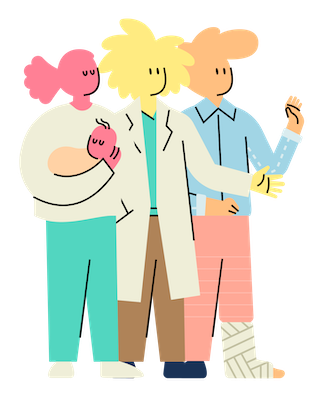
Patients and citizens (members of the public) are at the heart of health science research. Although not everyone can be an expert, the way that people feel, with regard to their health, is highly personal and hard to articulate for even the most seasoned medical researchers and doctors.
In modern history, the relationship between doctors and patients has drastically shifted; although some people may still have a very close bond with a family doctor or nurse, the way the public interacts with medical professionals has certainly evolved. With the onset of the internet and the digital age, new pathways for how patients interact with medical professionals, and their perception of medical research have changed alongside it, for better and worse. And, along with the outbreak of the COVID-19 pandemic, these relationships have shifted even further.
In many countries, front-line health workers have been lauded for their efforts during the COVID-19 crisis, it has now become increasingly apparent that researchers and science communicators need to work much harder to maintain public trust, and this is especially true for medical and health researchers.
This is where citizen science can help, by reaching out to citizens and communities and including input from those who are directly affected by these issues. Through citizen scientists’ involvement in health research, researchers can gain invaluable insight into the impact that these medical conditions have on patients and vulnerable communities in particular and the public in general. Additionally, citizen science initiatives also provide opportunities for improvements to be made to research designs and protocols, in ways that best suit the requirements of those taking part in research studies, and more importantly foster greater public trust in the procedures behind these research efforts.
Citizen science can be incorporated into research in different ways:
- Identification of issues- Citizens can help researchers understand the issues that they care about and help develop research questions that help solve the real-world issues faced by those suffering from these conditions.
- Co-Design of research experiment- Citizens’ active involvement in the design process of the experiment /study is essential to ensuring that the research practices align with the needs and requirements of those who are taking part in the study.
- Co-collection of data- – Citizens and communities contributing in the collection of data can allow for richer data sets collected with a greater number of data points.
- Co-development of evidence – Citizens’ and communities’ support in the data analysis can provide a more representative analysis.
- Co-action- Citizens can share the research findings within their communities and beyond; and use the data and evidence to create a road map or a set of recommendations that would best help solve the real issues identified as important in the study design stage.
Additionally, inviting patients and citizens into the research environment provides an opportunity for them to gain a better understanding of the science behind the research. Thus, allowing them to be active participants in the scientific process and not just test subjects.
Moreover, research in collaboration with citizens can help researchers fill in any potential gaps in the research design and perceptions about the issues of interest, by being more considerate of the lived experiences of those suffering from these issues.
This is what StepChange – an interdisciplinary project hopes to achieve especially through two Citizen Science initiatives (CSI’s) on health:
- CSI on non-alcoholic fatty liver disease in the UK led by Oxford University Hospitals NHS Foundation Trust (NIHR Oxford BRC).
- CSI on infectious disease outbreak preparedness in Italy led by University of Rome Tor Vergata.
The use of citizen science approaches in medical and health research however requires important considerations, such as the ethical implications of using these approaches with citizen scientists. From the ethical perspective, the most important issues include possible constraints on the sharing of personal medical information, informed consent, the impact of research on human subjects, or the lack of access to patients/research participants by the citizen scientists involved in the research.
Hence, consideration of ethical issues in citizen science and health research is critical and needs to be incorporated into a comprehensive ethical governance framework. This may help maintain the trust and relationship between scientific researchers, citizen scientists and regulators of research in a changing research landscape.
